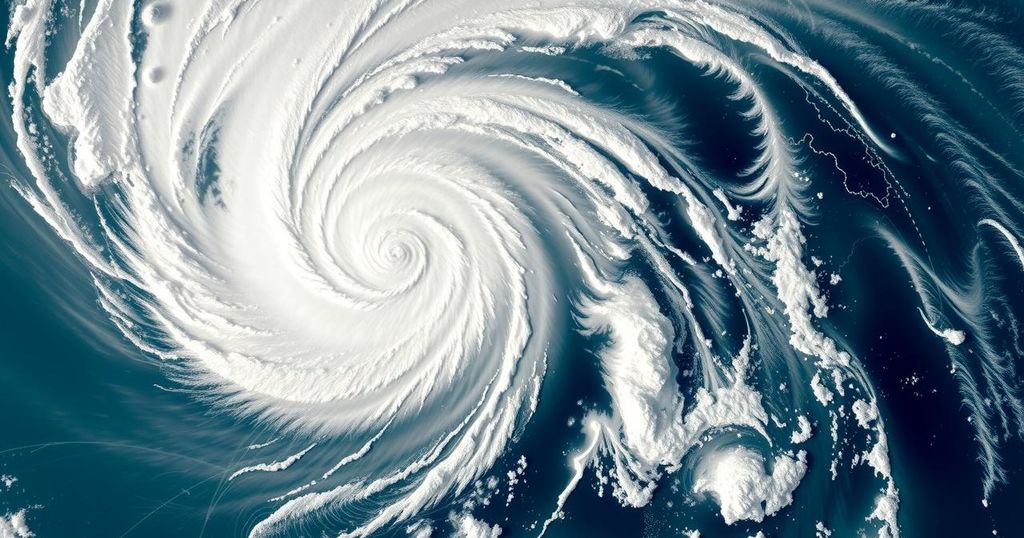Tropical Cyclone Chido: Catastrophic Impact on the Southwest Indian Ocean

Tropical Cyclone Chido has wreaked havoc in the Southwest Indian Ocean, declaring an early cyclone season with devastating impacts primarily in Madagascar, Mozambique, Mayotte, and Malawi. The cyclone, categorized as a category 4, resulted in 142 confirmed fatalities and thousands of injuries, with extensive destruction of infrastructure and displacement of communities. Ongoing humanitarian efforts aim to support affected individuals and enhance resilience against future cyclonic events.
Tropical Cyclone Chido has emerged as a devastating meteorological event in the Southwest Indian Ocean, marking the onset of what is anticipated to be an early and active cyclone season. Chido escalated into a category 4 cyclone on December 11, boasting sustained winds of 220 km/h and gusts reaching 250 km/h. As of December 22, the cyclone has tragically resulted in at least 142 confirmed fatalities across several nations, including Mozambique, Mayotte, and Malawi, alongside over 3,300 reported injuries.
The cyclone first impacted Madagascar, particularly the Diana Region, affecting an estimated 135,838 individuals. The severe weather caused widespread infrastructure damage and displacements, with authorities executing evacuations and issuing danger warnings. Subsequently, the Comoros government observed a week of mourning due to the severe effects on the islands of Anjouan and Moheli, where approximately 64,167 individuals were affected, including significant loss of housing and agricultural ruin.
In Mayotte, the destruction was extensive, with around 70 percent of the population—approximately 230,000 individuals—impacted by Chido. The cyclone demolished around 35,000 residential structures and significantly damaged vital facilities, including the main hospital and airport, which has resulted in serious disruptions to essential services.
Mozambique is experiencing critical consequences with approximately 622,000 people affected, predominantly in Cabo Delgado and other provinces, where a staggering 130,000 shelters have been compromised or destroyed. Additionally, in Malawi, nearly 45,000 individuals have encountered adverse conditions due to the cyclone’s residual effects, necessitating urgent humanitarian responses.
Current assessments are ongoing to evaluate the cyclone’s full extent of damages, focusing on infrastructure and agricultural losses. National Red Cross Societies are mobilized on the ground, actively participating in search and rescue, providing first aid, and assisting in family reunifications.
The impact of Cyclone Chido underscores the heightened need for disaster preparedness and resilience strategies within vulnerable communities. The Emergency Appeal aims to furnish essential resources necessary for effective humanitarian assistance, enhance readiness among National Societies, and bolster community resilience against the backdrop of a persistently active cyclone season.
Tropical Cyclone Chido is noted as the first cyclone of the season to significantly affect the Southwest Indian Ocean region, including Madagascar, Mozambique, and the Comoros. The cyclone’s rapid intensification and substantial wind speeds have raised concerns over preparedness and response to natural disasters in susceptible regions. As the cyclone has caused widespread fatalities and injuries, the humanitarian community is mobilizing resources and assistance to mitigate the impact on affected populations and enhance future resilience.
In conclusion, Tropical Cyclone Chido has had catastrophic effects across several countries in the Southwest Indian Ocean, with rising fatalities, injuries, and widespread infrastructural damage. The immediate response from humanitarian organizations highlights the urgency of preparedness and better management strategies for future storms. Addressing the challenges posed by such natural disasters remains imperative, as the cyclone season continues to pose significant risks to vulnerable populations and regions.
Original Source: reliefweb.int







